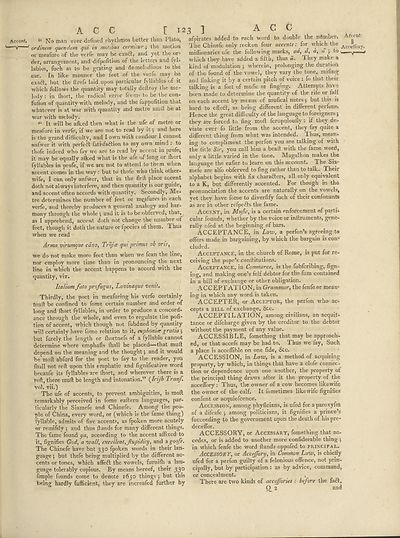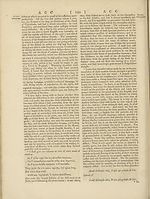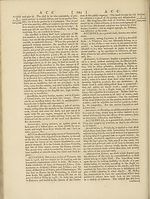Encyclopaedia Britannica, or, a Dictionary of arts, sciences, and miscellaneous literature : enlarged and improved. Illustrated with nearly six hundred engravings > Volume 1, A-AME
(141) Page 123
Download files
Complete book:
Individual page:
Thumbnail gallery: Grid view | List view

ACC [i
te No man ever defined rhythmos Letter than Plato,
ordinem quendam qui in mo!thus cermtur; the motion
or meafure of the verfe may be exa6t, and yet the or¬
der, arrangement, and difpofition of the letters and Syl¬
lables, fuch as to be grating and flnmelodious to the
ear. In like manner the feet of the verfe may be
exaft, but the firefs laid upon particular fyllables of it
which follows the quantity may totally deltroy the me¬
lody : in fliort, the radical error feems to be the con-
fufion of quantity with melody, and the fuppofition that
whatever is at war with quantity and metre mull be at
war with melody.
“ It will be. aficed then what is the ufe of metre or
meafure in verfe, if we are not to read by it; and here
is the grand difficulty, and I own with candour I cannot
anfwer it with perfeft fatisfaftion to my own mind : to
thofe indeed who fay we are to read by accent in profe,
it may be equally alked what is the ufe of long or ffiort
fyllables in profe, if we are not to attend to them when
accent comes in the way : but to thofe who think other-
wife, I can only anfwer, that in the firlt place accent
doth not always interfere, and then quantity is our guide,
and accent often accords with quantity. Secondly, Me¬
tre determines the number oi feet or myafures in each
verfe, and thereby produces a general analogy and har¬
mony through the whole •, and it is to be obferved, that,
as I apprehend, accent doth not change the number of
feet, though it doth the nature or ipecies of them, i hus
when we read
Arma virumque cdno, Trdjte qui primus ob oris,
we do not make more feet than when we fcan the line,
nor employ more time than in pronouncing the next
line in which the accent happens to accord with the
quantity, viz.
Italiam fato profugus, Lavinaque venit.
Thirdly, the poet in meafuring his verfe certainly
tnuft be confined to fome certain number and order of
long and fhort fyllables, in order to produce a concord¬
ance through the whole, and even to regulate the pofi-
tion of accent, which though not fubdued by quantity
will certainly have fome relation to it, euphonicr gratia \
but furely the length or ffiortnefs of a fyllable cannot
determine where emphafis {hall be placed—that muft
depend on the meaning and the thought 5 and it wmuld
be moll abfurd for the poet to fay to the reader, you
{hall not reft upon this emphatic and fignificative word
becaufe its fyllables are ftiort, and wherever there is a
reft, there muft be length and intonation.” {Irijb Tranf*
vol. vii.)
The ufe of accents, to prevent ambiguities, is moft
remarkably perceived in fome eaftern languages, par¬
ticularly the Siamefe and Chinefe. Among the peo¬
ple of China, every word, or (which is the lame thing)
fyliable, admits of five accents, as fpoken more acutely
or remifsly ; and thus ftands for many different things.
The fame found ya, according to the accent affixed to
it, fignifies God, a wall, excellent, Jlupidity, and a goofe.
The Chinefe have but 330 fpoken words in their lan¬
guage ; but thefe being multiplied by the difterent ac¬
cents or tones, which affeft the vowels, furnifti a lan¬
guage tolerably copious. By means hereof, their 330
fimple founds come to denote 1650 things ; but this
being hardly fufficient, they are increafed further by
23 ] A C C
afpirates added to each word to double the ntimbes. A. 01..
The Chinefe only reckon four accents: for which the ^cce{j-oryt
miffionaries ufe the following marks, ad, d, a, a •, to
which they have added a fifth, thus «. They make a
kind of modulation j wherein, prolonging the duration
of the found of the vowel, they vary the tone, raifing
and linking it by a certain pitch of voice : fo that their
talking is a fort of mufic or finging. Attempts have
been made to determine the quantity of the rife or fall
on each accent by means of mufical notes $ but this is
hard to effeif, as being different in different perfons.
Hence the great difficulty of the language to foreigners ;
they are forced to fing moft ferupuloufty : if they de¬
viate ever fo little from the accent, they lay quite a
different thing from what was intended. Thus, mean¬
ing to compliment the perfon you are talking of with
the title Sir, you call him a beaft with the lame word,
only a little varied in the tone. Magalhon makes the
language the eafier to learn on this account. 1 he Sia-
mefe are alfo obferved to fing rather than to talk. I heir
alphabet begins with fix chara&ers, all only equivalent
to a K, but differently accented. For though in the
pronunciation the accents are naturally on the vowels,
yet they have fome to diverfify fuch of their confonants
as are in other refpetfts the fame.
Accent, in Mujic, is a certain enforcement of parti¬
cular founds, whether by the voice or inftruments, gene¬
rally ufed at the beginning of bars.
ACCEPTANCE, in Law, a perfon’s agreeing to
offers made in bargaining, by which the bargain is con¬
cluded.
Acceptance, in the church of Rome, is put for re¬
ceiving the pope’s conftitutions.
Acceptance, in Commerce, is the fubfcribing, fign-
ing, and making one’s felf debtor for the fum contained
in a bill of exchange or other obligation.
ACCEPTATION, in Grammar, the fenfe or mean
ing in which any wrord is taken.
ACCEPTER, or Acceptor, the perfon who ac¬
cepts a BILL of exchange, &c.
ACCEPTILATION, among civilians, an acquit¬
tance or difcbarge given by the creditor to the debtor
without the payment of any value.
ACCESSIBLE, fomething that may be approach¬
ed, or that accefs may be had to. Thus we fay, Such
a place is acceflible on one fide, &c.
ACCESSION, in Law, is a method of acquiring
property, by which, in things that have a clofe connec¬
tion or dependence upon one another, the property of
the principal thing draws after it the property of the
acceffory : Thus, the owner of a cow becomes likewife
the owner of the calf. It fometimes likewife fignifies
confent or acquiefcence.
Accession, among phyficians, is ufed for a paroxyfm
of a difeafe •, among politicians, it fignifies a prince’s
fucceeding to the government upon the death of his pre-
deceffor.
ACCESSORY, or Accessary, fomething that ac¬
cedes, or is added to another more confiderable thing 5
in which fenfe the word ftands oppofed to principal.
Accessor T, or AcceJJary, in Common Law, is chiefiy
ufed for a perfon guilty of a felonious offence, not prin¬
cipally, but by participation: as by advice, command,
or concealment.
There are two kinds of accejfones : before the fa£f,
2 and
te No man ever defined rhythmos Letter than Plato,
ordinem quendam qui in mo!thus cermtur; the motion
or meafure of the verfe may be exa6t, and yet the or¬
der, arrangement, and difpofition of the letters and Syl¬
lables, fuch as to be grating and flnmelodious to the
ear. In like manner the feet of the verfe may be
exaft, but the firefs laid upon particular fyllables of it
which follows the quantity may totally deltroy the me¬
lody : in fliort, the radical error feems to be the con-
fufion of quantity with melody, and the fuppofition that
whatever is at war with quantity and metre mull be at
war with melody.
“ It will be. aficed then what is the ufe of metre or
meafure in verfe, if we are not to read by it; and here
is the grand difficulty, and I own with candour I cannot
anfwer it with perfeft fatisfaftion to my own mind : to
thofe indeed who fay we are to read by accent in profe,
it may be equally alked what is the ufe of long or ffiort
fyllables in profe, if we are not to attend to them when
accent comes in the way : but to thofe who think other-
wife, I can only anfwer, that in the firlt place accent
doth not always interfere, and then quantity is our guide,
and accent often accords with quantity. Secondly, Me¬
tre determines the number oi feet or myafures in each
verfe, and thereby produces a general analogy and har¬
mony through the whole •, and it is to be obferved, that,
as I apprehend, accent doth not change the number of
feet, though it doth the nature or ipecies of them, i hus
when we read
Arma virumque cdno, Trdjte qui primus ob oris,
we do not make more feet than when we fcan the line,
nor employ more time than in pronouncing the next
line in which the accent happens to accord with the
quantity, viz.
Italiam fato profugus, Lavinaque venit.
Thirdly, the poet in meafuring his verfe certainly
tnuft be confined to fome certain number and order of
long and fhort fyllables, in order to produce a concord¬
ance through the whole, and even to regulate the pofi-
tion of accent, which though not fubdued by quantity
will certainly have fome relation to it, euphonicr gratia \
but furely the length or ffiortnefs of a fyllable cannot
determine where emphafis {hall be placed—that muft
depend on the meaning and the thought 5 and it wmuld
be moll abfurd for the poet to fay to the reader, you
{hall not reft upon this emphatic and fignificative word
becaufe its fyllables are ftiort, and wherever there is a
reft, there muft be length and intonation.” {Irijb Tranf*
vol. vii.)
The ufe of accents, to prevent ambiguities, is moft
remarkably perceived in fome eaftern languages, par¬
ticularly the Siamefe and Chinefe. Among the peo¬
ple of China, every word, or (which is the lame thing)
fyliable, admits of five accents, as fpoken more acutely
or remifsly ; and thus ftands for many different things.
The fame found ya, according to the accent affixed to
it, fignifies God, a wall, excellent, Jlupidity, and a goofe.
The Chinefe have but 330 fpoken words in their lan¬
guage ; but thefe being multiplied by the difterent ac¬
cents or tones, which affeft the vowels, furnifti a lan¬
guage tolerably copious. By means hereof, their 330
fimple founds come to denote 1650 things ; but this
being hardly fufficient, they are increafed further by
23 ] A C C
afpirates added to each word to double the ntimbes. A. 01..
The Chinefe only reckon four accents: for which the ^cce{j-oryt
miffionaries ufe the following marks, ad, d, a, a •, to
which they have added a fifth, thus «. They make a
kind of modulation j wherein, prolonging the duration
of the found of the vowel, they vary the tone, raifing
and linking it by a certain pitch of voice : fo that their
talking is a fort of mufic or finging. Attempts have
been made to determine the quantity of the rife or fall
on each accent by means of mufical notes $ but this is
hard to effeif, as being different in different perfons.
Hence the great difficulty of the language to foreigners ;
they are forced to fing moft ferupuloufty : if they de¬
viate ever fo little from the accent, they lay quite a
different thing from what was intended. Thus, mean¬
ing to compliment the perfon you are talking of with
the title Sir, you call him a beaft with the lame word,
only a little varied in the tone. Magalhon makes the
language the eafier to learn on this account. 1 he Sia-
mefe are alfo obferved to fing rather than to talk. I heir
alphabet begins with fix chara&ers, all only equivalent
to a K, but differently accented. For though in the
pronunciation the accents are naturally on the vowels,
yet they have fome to diverfify fuch of their confonants
as are in other refpetfts the fame.
Accent, in Mujic, is a certain enforcement of parti¬
cular founds, whether by the voice or inftruments, gene¬
rally ufed at the beginning of bars.
ACCEPTANCE, in Law, a perfon’s agreeing to
offers made in bargaining, by which the bargain is con¬
cluded.
Acceptance, in the church of Rome, is put for re¬
ceiving the pope’s conftitutions.
Acceptance, in Commerce, is the fubfcribing, fign-
ing, and making one’s felf debtor for the fum contained
in a bill of exchange or other obligation.
ACCEPTATION, in Grammar, the fenfe or mean
ing in which any wrord is taken.
ACCEPTER, or Acceptor, the perfon who ac¬
cepts a BILL of exchange, &c.
ACCEPTILATION, among civilians, an acquit¬
tance or difcbarge given by the creditor to the debtor
without the payment of any value.
ACCESSIBLE, fomething that may be approach¬
ed, or that accefs may be had to. Thus we fay, Such
a place is acceflible on one fide, &c.
ACCESSION, in Law, is a method of acquiring
property, by which, in things that have a clofe connec¬
tion or dependence upon one another, the property of
the principal thing draws after it the property of the
acceffory : Thus, the owner of a cow becomes likewife
the owner of the calf. It fometimes likewife fignifies
confent or acquiefcence.
Accession, among phyficians, is ufed for a paroxyfm
of a difeafe •, among politicians, it fignifies a prince’s
fucceeding to the government upon the death of his pre-
deceffor.
ACCESSORY, or Accessary, fomething that ac¬
cedes, or is added to another more confiderable thing 5
in which fenfe the word ftands oppofed to principal.
Accessor T, or AcceJJary, in Common Law, is chiefiy
ufed for a perfon guilty of a felonious offence, not prin¬
cipally, but by participation: as by advice, command,
or concealment.
There are two kinds of accejfones : before the fa£f,
2 and
Set display mode to:
![]() Universal Viewer |
Universal Viewer | ![]() Mirador |
Large image | Transcription
Mirador |
Large image | Transcription
Images and transcriptions on this page, including medium image downloads, may be used under the Creative Commons Attribution 4.0 International Licence unless otherwise stated. ![]()
| Permanent URL | https://digital.nls.uk/193133818 |
|---|
| Attribution and copyright: |
|
|---|
| Description | Ten editions of 'Encyclopaedia Britannica', issued from 1768-1903, in 231 volumes. Originally issued in 100 weekly parts (3 volumes) between 1768 and 1771 by publishers: Colin Macfarquhar and Andrew Bell (Edinburgh); editor: William Smellie: engraver: Andrew Bell. Expanded editions in the 19th century featured more volumes and contributions from leading experts in their fields. Managed and published in Edinburgh up to the 9th edition (25 volumes, from 1875-1889); the 10th edition (1902-1903) re-issued the 9th edition, with 11 supplementary volumes. |
|---|---|
| Additional NLS resources: |
|

